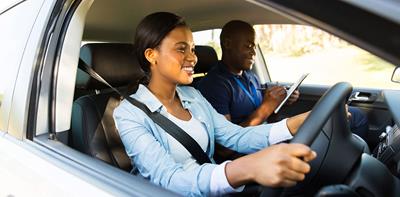
The early days of nappies, sleepless nights and tantrums were no doubt tough. And the arrival of teenage years certainly would have brought their own challenges. But now comes arguably parenthood’s most formidable task: it’s time to teach your offspring to drive.
The current shortage of driving instructors means the pressure is on parents like never before to help their children take one of the biggest steps towards adulthood and freedom, and become proficient behind the wheel. Yes, they’ll still need lessons with a professional, but you can help them get started and increase their confidence as they work towards their test.
But just because you yourself may have plenty of experience driving, it doesn’t necessarily mean you’re totally ready to transform your son or daughter into a capable motorist.
You have probably picked up a few bad habits, and may not be as familiar with the latest rules of the road as you should be; but most of all, you need to know how to share a car with your offspring and teach them a difficult technical skill - all whilst not driving each other mad.
So how can you teach your child some essential driving skills - to help them on their way - without becoming sworn enemies? At least, until a professional driving instructor can step in to polish any rough edges.
We’ve spoken to some recently qualified drivers and parents and gathered their best tips which might help.
Don’t rush your child
Even if your child is eager to start learning and pass their test, they may not yet be ready to go out with you on a driving lesson.
One such driver, Molly, who recently passed her test in Gloucester after having taken lessons with both a professional instructor and her parents, advises parents to go at their child’s pace.
She says: “My parents were eager to get me out on the road in my brother's Corsa and I felt a lot of pressure to begin driving sooner than I was ready. Personally, I didn’t feel comfortable getting straight onto the road without a few driving lessons with a trained instructor - and the dual control safety net - beforehand.
“So, if your child is a nervous driver, try not to rush them, let them take it at their own pace”, Molly adds. “After all, a mistake on an independent lesson could lead to more stress and nerves.”
And this can work both ways. Parents need to take things slowly too, to build up confidence in their child behind the wheel, while they may be a little nervous sitting alongside them. Another recently qualified driver, Sophie, who passed her test in Cardiff, suggests “parents might want to begin lessons on quieter roads until they feel confident in their child's abilities to control the vehicle”.
Stay calm
This one is easier said than done. But it really can’t be stressed enough - you’re going to have to draw on all of your reserves of patience!
Molly says: “Try to remain calm. Naturally, you may be wary when in the car with a learner, but try not to show any panic or stress as this could damage their confidence. Be firm with instructions, without implying that you’re nervous.”
Remember to take advantage of any mishaps or hairy moments, and to try and use them as an opportunity, suggests Sophie. She says: “Things go wrong and when they do, these are excellent teachable moments to highlight what to do in the event that your car stalls or skids for example. Be prepared to handle these mistakes with grace - your child is trying their best!”
Put in the hours and vary the conditions
Parents who have recently taken their kids out have some tips and advice to share too.
Among them is Cathy, from Southampton, who describes herself as a “paranoid mum of a daughter who has passed her test with flying colours”.
She talks about the importance of putting in long hours with your child - and ensuring you help them get experience driving under different conditions. “We started with short journeys, which grew to much longer ones of 25 miles plus, in both daytime and darkness,” says Cathy. “Getting this experience made her aware that driving at night was completely different to daylight,” she adds.
Once her daughter became more confident, Cathy tried some other tactics. “I tested her by covering her interior mirror with my hand and she had to tell me the colour of the car behind, all while making sure she had good distance from the car in front and stopping distances were as according to the weather,” she says.
Brush up on your own skills!
Like many parents helping their child to drive, Cathy was careful not to pass on any bad habits that she had picked up over 35 years behind the wheel herself. She recognises that there’s no substitute for a professional driving instructor to ensure leaners are totally test ready.
Molly agrees, suggesting: “Make sure you know your stuff before hitting the roads with a learner driver, and brush up on any new changes to the rules. It’s particularly important to be knowledgeable on things that a learner might not have encountered during their lessons - for example, knowing what to do while overtaking horses or cyclists.”
Get out there
While these tips should help you make the most of your time in the passenger seat with your child, at the end of the day, as long as you can stay calm and patient, they’re likely to appreciate any extra precious time they can get behind the wheel.
This can make a huge difference for learners when lessons with an instructor are expensive or hard to book. As Cathy says: “I am 100% sure all the driving I did with my daughter helped massively with passing first time, and helped make her a better, more confident driver.”


